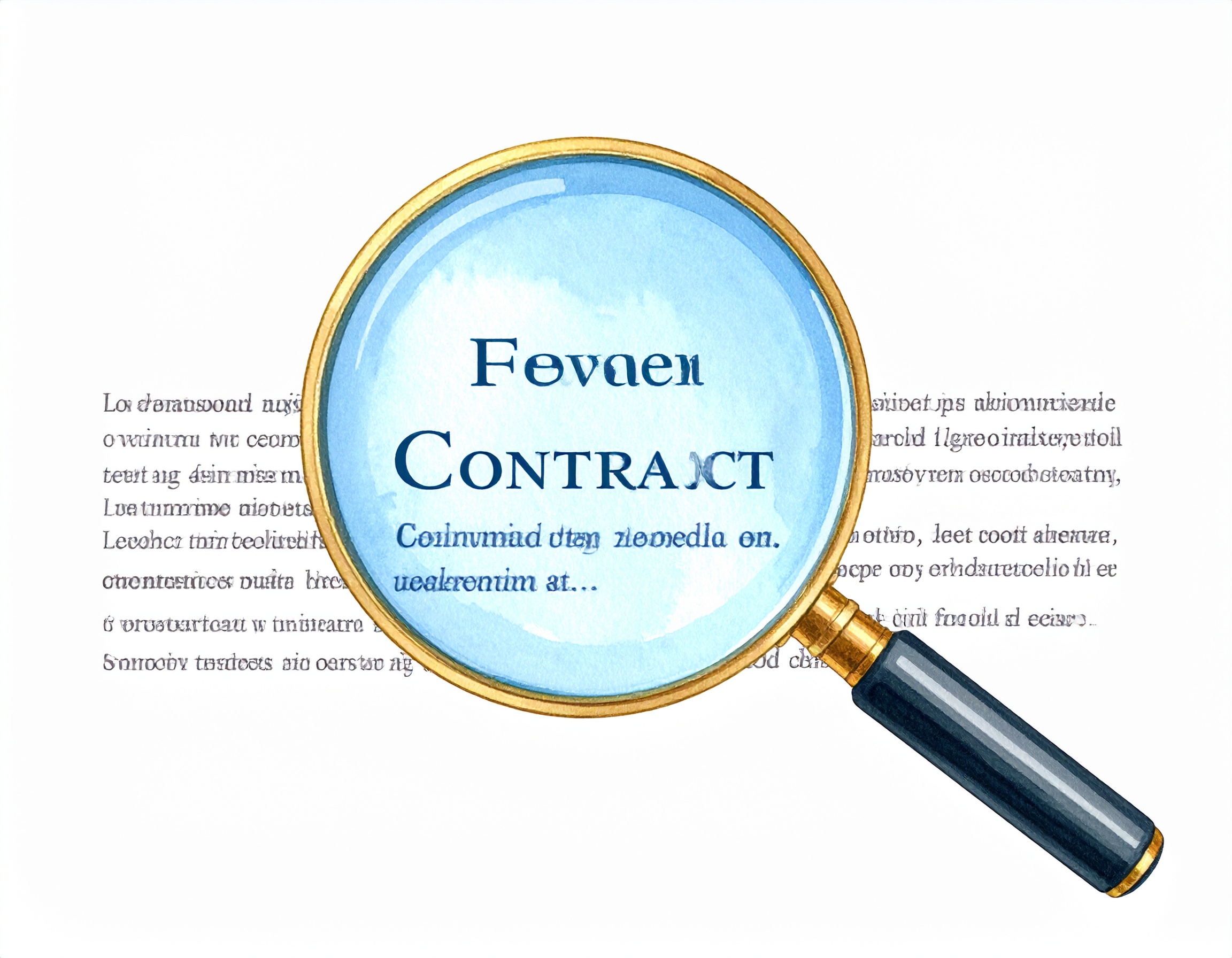Contract Drafting Mistakes to Avoid: A Comprehensive Guide

by Counseal Team
Updated May 29, 2025

Contracts are the backbone of any business relationship, laying out the rules for how you engage with partners, suppliers, employees, and clients. Think of them as your business’s playbook—when the rules are clear, everyone knows the game plan, the objectives, and how to handle unexpected challenges.
Contracts are the backbone of any business relationship, laying out the rules for how you engage with partners, suppliers, employees, and clients. Think of them as your business’s playbook—when the rules are clear, everyone knows the game plan, the objectives, and how to handle unexpected challenges.
Well-drafted contracts don’t just set expectations; they safeguard your interests, prevent misunderstandings, and minimise the risk of costly disputes. A few extra lines of clarity today can save you from significant legal and financial headaches down the road.
According to a 2023 study by the Nigerian Bar Association, over 65% of business disputes in Nigeria stem from poorly drafted contracts, highlighting the critical importance of getting this fundamental aspect right from the start.
Now, let’s examine the common mistakes that can derail a contract—and how to avoid them.
Understanding Contract Drafting
Contract drafting is both a science and an art—translating business agreements into legally binding documents with precision and clarity. A well-drafted contract serves as a sturdy bridge between parties, ensuring everyone clearly understands their obligations and entitlements.
Definition and Purpose
Contract drafting is the process of documenting the terms and conditions of a business arrangement to create a legally enforceable document. Its purpose is to clearly define the rights and obligations of all involved parties, preventing misunderstandings and establishing concrete expectations. It’s essentially setting the stage for a drama-free partnership.
Key Elements of a Contract
Every solid contract contains these fundamental elements:
- Offer: What one party promises to do or not do in exchange for something of value
- Acceptance: The other party’s agreement to the offer’s terms
- Consideration: The value exchanged between parties (money, services, goods)
- Intention to create legal relations: Both parties must intend for the agreement to be legally binding
- Capacity: All parties must have the legal ability to enter into a contract
Importance of Accurate Contract Drafting
Legal Implications
A 2024 report by KPMG Nigeria identified poorly drafted contracts as one of the top three causes of business disputes in the country. Without a solid contract, you’re essentially building your business relationship on quicksand.
Contracts serve as your legal shield, clearly outlining what happens if things go awry and keeping you out of lengthy court battles that drain your resources. In Nigeria’s complex legal environment, well-drafted contracts are particularly crucial given the sometimes lengthy judicial process for resolving disputes.
Protecting Business Interests
From a business perspective, your contract is your compass, guiding you through the unpredictable waters of commerce. It clearly lays out terms, conditions, and expectations, ensuring all parties are aligned.
Well-drafted contracts shield you from liability, safeguard your intellectual property, and secure your payment terms. For instance, a properly structured contract can prevent scenarios where a vendor attempts to deliver substandard goods by specifying quality standards, delivery schedules, payment terms, and penalties for non-compliance.
Common Contract Drafting Mistakes
1. Ambiguous Language
Vague terminology is perhaps the most common yet problematic issue in contract drafting. Terms like “reasonable,” “promptly,” or “appropriate” can be interpreted differently by each party, creating fertile ground for disputes.
Real Impact: In 2022, a Lagos-based tech firm found itself in a six-month delivery dispute because their contract specified that a vendor should deliver “within a reasonable time.” The vendor considered three months reasonable, while the firm expected delivery within three weeks. This ambiguity cost the tech firm ₦15 million in project delays and legal fees.
Solution: Be specific and quantifiable. Instead of “deliver promptly,” specify “deliver within three business days of receiving the order.”
2. Incomplete Terms and Conditions
Omitting critical details from your contract is like setting sail without a compass. Every crucial aspect of the agreement must be clearly documented.
Real Impact: A Nigerian entrepreneur entered a joint venture without specifying profit-sharing terms. When the venture generated unprecedented profits, disputes erupted over distribution. The entrepreneur lost not only a substantial percentage of the profits but also valuable business relationships.
Solution: Create comprehensive checklists for each contract type (employment, vendor, partnership) to ensure all essential elements are included.
3. Failure to Define Key Terms
Undefined terminology creates dangerous landmines in your contract. Each party may interpret undefined terms differently, creating conflict when these interpretations inevitably clash.
Real Impact: A Nigerian startup lost exclusive rights to its core technology because the contract failed to clearly define “exclusivity.” A competitor exploited this loophole, resulting in a significant market share loss for the startup.
Solution: Include a detailed definitions section in every contract, clearly explaining all technical, industry-specific, or potentially ambiguous terms.
4. Overlooking Legal Requirements
Contracts must comply with relevant laws and regulations to be enforceable. In Nigeria, this includes requirements like proper stamping of certain agreements.
Real Impact: A business owner in Port Harcourt ignored local licensing laws in a commercial lease agreement. The oversight resulted in a ₦2 million fine and temporary business closure.
Solution: Engage qualified legal counsel familiar with Nigerian business law to review contracts before finalisation.
5. Ignoring Specificity and Clarity
Contracts lacking specificity create confusion similar to the children’s game of “telephone.” Information gets distorted as different interpretations emerge.
Real Impact: A manufacturing contract stating “deliver goods” without specifying type, quantity, or quality standards led to a major dispute when the supplier delivered materials that were technically “goods” but entirely unsuitable for the manufacturer’s needs.
Solution: Be exhaustively specific about deliverables, timelines, quality standards, and all other material aspects of the agreement.
6. Overly Complex Jargon
While legal terminology has its place, excessive jargon can obscure meaning and create confusion.
Real Impact: A small business owner in Abuja signed a contract filled with complex legal terminology he didn’t understand. The agreement contained unfavourable terms that resulted in significant financial losses when a dispute arose.
Solution: Use plain, straightforward language wherever possible. When legal terminology is necessary, ensure all parties understand its meaning.
7. Forgetting Dispute Resolution Mechanisms
Every contract should include clear procedures for resolving disagreements before they escalate to litigation.
Real Impact: Two Lagos businesses spent over ₦25 million in litigation costs because their contract lacked dispute resolution provisions. The matter could have been resolved through mediation for a fraction of the cost.
Solution: Include tiered dispute resolution clauses that require negotiation, then mediation, before arbitration or litigation.
Key Considerations in Contract Drafting
Legal Counsel Involvement
Role of Legal Professionals
Legal professionals are the unsung heroes of contract drafting, ensuring every detail is properly addressed. They translate complex legal concepts into clear terms while protecting your interests.
According to the Nigerian Corporate Affairs Commission, businesses that regularly employ legal counsel for contract review experience 40% fewer contractual disputes than those that don’t.
Benefits of Legal Review
Legal review provides crucial safeguards:
- Identifies and addresses potential risks
- Ensures compliance with current laws and regulations
- Clarifies ambiguous terms
- Protects your rights and limits liabilities
- Provides peace of mind
Regular Updates and Revisions
Importance of Keeping Contracts Up-to-Date
Business environments evolve constantly. Regulatory changes, market shifts, and business growth all necessitate contract updates. Outdated contracts create misalignments between parties’ expectations and legal obligations.
Case Study: Issues from Outdated Contracts
A Lagos tech startup faced significant complications when their three-year-old supplier agreement hadn’t been revised to reflect new data protection requirements under Nigeria’s recent data protection regulations. The outdated contract exposed them to compliance risks and nearly cost them a major client concerned about data security.
Clear Communication with All Parties
Ensuring Mutual Understanding
Clear communication ensures everyone interprets the contract terms consistently. Before finalisation, all parties should have the opportunity to:
- Ask questions about contract terms
- Request clarification on confusing provisions
- Propose modifications to problematic clauses
- Confirm their understanding of obligations and rights
This collaborative approach reduces the likelihood of disputes and strengthens business relationships.
Step-by-Step Guide to Drafting a Contract
1. Understand the Purpose
Before drafting begins, clearly define the contract’s objective. Are you establishing a partnership, protecting intellectual property, or outlining service terms? This clarity prevents scope creep and ensures the contract addresses all relevant aspects of the relationship.
2. Identify the Parties Involved
Precisely specify who is entering the agreement, using legal names and accurate contact details. For businesses, include registration numbers and registered addresses. For individuals, include identification numbers where appropriate. Misidentification can render contracts unenforceable.
3. Define the Terms and Conditions
This critical section should exhaustively cover:
- Scope of work or services
- Deliverables and quality standards
- Timeline and milestones
- Payment terms and schedule
- Rights and responsibilities of each party
- Confidentiality provisions
- Intellectual property ownership
- Termination conditions
Leave no room for ambiguity—if a clause could be interpreted in multiple ways, it requires revision.
4. Consider Legal Requirements
Nigeria’s legal landscape requires specific elements for contract enforceability. These may include:
- Proper stamping
- Notarisation requirements
- Industry-specific regulatory compliance
- Corporate governance approvals
- Tax implications
Consult with legal experts to ensure compliance with all applicable regulations.
5. Incorporate Contingency Clauses
Prepare for the unexpected with provisions addressing:
- Force majeure events
- Material changes in circumstances
- Default and remedy procedures
- Termination rights
- Assignment and delegation rules
- Dispute resolution mechanisms
These clauses provide a roadmap for handling unforeseen challenges without resorting to litigation.
Tools and Resources
Recommended Tools for Contract Drafting
Modern technology offers valuable resources to streamline the contract drafting process:
Counseal Free Nigerian Documents: Access our library of free, Nigeria-specific legal document templates crafted by experienced Nigerian legal professionals. These templates are tailored to comply with Nigerian law and business practices, making them an invaluable resource for local entrepreneurs and businesses.
PandaDoc: This platform offers template-based contract creation with professional formatting. Its analytics feature tracks document views and interactions, providing insight into how counterparties engage with your contracts.
DocuSign: Electronic signature capabilities make contract execution efficient and paperless. DocuSign’s legally binding signatures are recognised in Nigeria, and the platform integrates with popular business tools like Salesforce.
LawDepot: This service provides customisable templates covering numerous agreement types, from non-disclosure agreements to partnership contracts. It’s particularly useful for entrepreneurs creating standard contracts.
These tools save time while reducing error risk, but they don’t replace professional legal advice for complex or high-value agreements.
Conclusion
Recap of Key Points
- Clarity is King: Ambiguity creates disputes. Use precise, simple language that leaves no room for multiple interpretations.
- Precision with Details: Thoroughly document all aspects of the agreement, including specific deliverables, timelines, and quality standards.
- Leverage Expert Insights: Legal professionals bring crucial expertise that prevents costly errors. Their fees are an investment that pays dividends through risk reduction.
- Anticipate the Unexpected: Comprehensive contracts address potential future scenarios through contingency clauses and dispute resolution mechanisms.
- Review and Revise: Treat contracts as living documents that require periodic updates to reflect changing business realities and regulatory environments.
Effective contract drafting isn’t merely a legal formality—it’s a foundational business practice that protects your interests, clarifies expectations, and provides a roadmap for successful business relationships.
For personalised guidance on your specific contract needs, schedule a free consultation with our expert legal team.
For more resources on contract drafting and other legal insights for Nigerian businesses, visit counseal.com/start.





